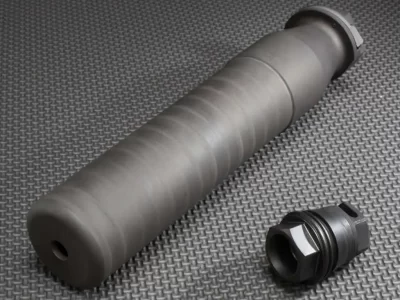Suppressors generally have a negative reputation, largely fueled by Hollywood portrayals of assassins and gangsters, but the vast majority of users simply appreciate the utility of suppressed fire. Suppressors attach to the barrel of a handgun, rifle, or shotgun and serve to quiet sound and reduce the vibration and kickback of fire.
Suppressors are effective tools for minimizing the decibel levels associated with firearms. While this is an obvious benefit for protecting an individual’s hearing, this reduction in noise pollution has significant implications for both wildlife and human communities.
Impact on Wildlife
Loud noises from gunfire can stress wildlife, causing animals to flee from their habitats or alter their natural behaviors. For example, studies show that loud disturbances can disrupt nesting patterns in birds, leading to lower reproductive success.
A 2017 study published in Ecological Applications indicated that consistent noise exposure can result in a 60% decrease in species richness in affected areas. Suppressors help maintain quieter environments, promoting biodiversity and healthier ecosystems.
Enhanced Community Relations
As shooting ranges and hunting areas face increasing scrutiny regarding noise disturbances, suppressors can help improve relationships between shooters and local communities. With the adoption of suppressors, the sound of gunfire becomes less intrusive, reducing complaints from nearby residents and fostering a more positive perception of shooting sports.
In some regions where suppressor use is encouraged, local communities have reported fewer noise-related complaints, leading to more cooperative relationships between shooters and residents. Additionally, suppressor use can serve to broaden participation in shooting sports, attracting individuals who are sensitive to noise or those new to the hobby. This broader participation can lead to a more diverse community of responsible shooters.
Promotion of Sustainable Practices
Suppressors can foster a culture of sustainability within shooting sports and hunting and align with conservation efforts. By reducing noise, shooters can engage in wildlife management and control without significantly impacting animal behavior. The U.S. Fish and Wildlife Service notes that controlled hunting helps maintain balanced ecosystems, and using suppressors can facilitate these efforts while minimizing disturbances.
Minimizing Disturbance to Recreational Spaces
Suppressors play a critical role in preserving the natural ambiance of outdoor recreational areas. The use of suppressors allows shooters to engage in their sport while preserving the tranquility of natural environments. Maintaining natural sounds is particularly important in public lands where outdoor enthusiasts seek a peaceful experience. A report from the National Park Service highlighted that noise pollution disrupts visitor experiences, and quieter shooting practices can enhance enjoyment for all outdoor users, including hikers and wildlife watchers.
Support for Sound Regulations
Most populated areas already have sound ordinances in place that designate quiet times or define what constitutes a sound nuisance. As communities become more aware of the impacts of noise pollution, the adoption of suppressors can help align shooting activities with emerging sound regulations. This also results in less pressure on local law enforcement and courts to handle noise complaints and any related lawsuits.
Suppressors allow shooters to remain compliant with local noise ordinances while still enjoying their sport. By advocating for suppressor use, shooters can demonstrate their commitment to responsible and sustainable practices.
Some states have implemented policies promoting suppressor use in hunting to address noise concerns, leading to successful outcomes in both wildlife management and community relations.
The environmental benefits of suppressors are multifaceted, encompassing reduced noise pollution, improved community relations, and the promotion of sustainable practices in shooting sports. By using suppressors, shooters not only protect their hearing but also contribute to the preservation of wildlife habitats and the enhancement of outdoor experiences for all. This proactive approach aligns shooting sports with broader conservation goals, fostering a responsible and respectful relationship with the environment.



 Understanding Trust Restatements
Understanding Trust Restatements